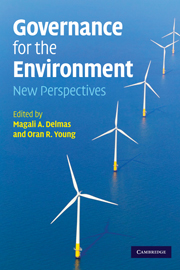Book contents
- Frontmatter
- Contents
- List of figures
- List of tables
- List of contributors
- Preface
- PART I Central threads and analytic perspectives
- PART II Governance for solving environmental problems: perspectives from economics, political science, and management
- PART III The effectiveness of governance for sustainable development
- 5 transnational actors and global environmental governance
- 6 The effectiveness of voluntary environmental initiatives
- 7 The emergence of non-state market-driven (NSMD) global environmental governance: a cross-sectoral assessment
- PART IV Conclusion
- References
- Index
7 - The emergence of non-state market-driven (NSMD) global environmental governance: a cross-sectoral assessment
Published online by Cambridge University Press: 05 June 2012
- Frontmatter
- Contents
- List of figures
- List of tables
- List of contributors
- Preface
- PART I Central threads and analytic perspectives
- PART II Governance for solving environmental problems: perspectives from economics, political science, and management
- PART III The effectiveness of governance for sustainable development
- 5 transnational actors and global environmental governance
- 6 The effectiveness of voluntary environmental initiatives
- 7 The emergence of non-state market-driven (NSMD) global environmental governance: a cross-sectoral assessment
- PART IV Conclusion
- References
- Index
Summary
Introduction
The failure of states and intergovernmental processes to address some of the most important environmental problems facing the planet – explanations of which can often be traced back to “tragedy of the commons” or “collective action” dilemmas (see Delmas and Young in their Introduction to this volume) – has resulted in the proliferation of alternative nongovernmental approaches. Often grouped under the broad rubric of “corporate social responsibility” (CSR) these efforts comprise an array of initiatives including self-regulation (see King and Toffel, Chapter 4, this volume), voluntary environmental agreements (Khanna and Brouhle, Chapter 6, this volume), and public–private partnerships.
Just how these innovations might become enduring and effective features of global environmental governance is arguably one of the most critical questions facing scholars and practitioners in the global era. This chapter focuses on one of the most unique nongovernmental institutional innovations that has attracted the attention of both practitioners and scholars: certification systems that attempt to reward environmentally responsible business practices through positive recognition and market incentives. That they do not appeal to the state for rule-making authority, but instead derive authority from evaluations of stakeholders who choose whether to demand such products, has led Cashore (2002) and Cashore, Auld, and Newsom (2004) to refer to them as “non-state market-driven” (NSMD). With certification institutions, firms are often coerced and cajoled by problem-focused environmental groups or, in some cases, mission-driven but incapacitated governmental officials or agencies.
- Type
- Chapter
- Information
- Governance for the EnvironmentNew Perspectives, pp. 183 - 218Publisher: Cambridge University PressPrint publication year: 2009
- 42
- Cited by



